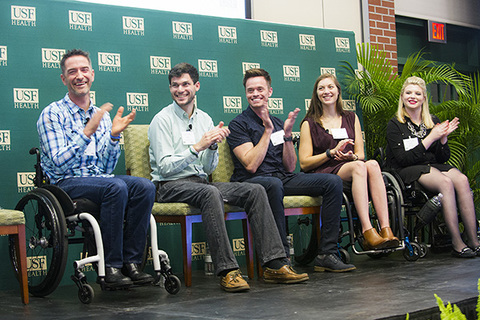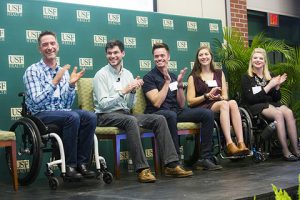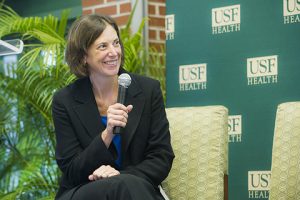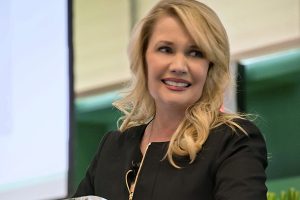FARA’s 9th Annual ‘Energy’ Symposium, Patient-oriented Event, Takes Place at USF on Sept. 14
Written by |

Members of the patient discussion panel at the 2016 symposium. (Photo courtesy of the University of South Florida)
Editor’s Note: The 2017 symposium had to be canceled because of Hurricane Irma, but the Energy Ball event was held as planned.
The Friedreich’s Ataxia Research Alliance teams up with the University of South Florida next week on a patient-oriented symposium spotlighting the latest developments in the quest to cure the rare neurodegenerative disease.
Two days later, the alliance’s biggest annual fund-raiser — a gala known as the Energy Ball — will take place. To date, more than $9 million raised through the gala has helped to support drug discovery, development, and research, including five clinical trials.
The ninth symposium will be Sept. 14 at the campus’ Gibbons Alumni Center, and the ninth gala on Sept. 16 at the nearby Tampa Marriott Waterside Hotel & Marina. The meeting’s theme is Understanding Energy for a Cure, a reference — like the Energy Ball — to the impact that the faulty Friedreich’s ataxia gene has on mitochondria, the cells’ energy powerhouses.
About 250 people are expected to attend the symposium, and 500 from around the world to watch it on a live webcast, according to the research alliance, known by its acronym FARA.
The connection FARA made with USF a decade ago was a natural one, because the university has a nationally recognized Ataxia Research Center. Dr. Theresa Zesiewicz, who heads the center, will discuss the latest on the program’s initiatives at the meeting.
This year’s symposium will also offer three panel discussions — among patients, researchers, and FARA team and board members.
The patient panel discussion has always been one of the symposium’s most popular features, according to Jennifer Farmer, FARA’s executive director. The three or more patients who take part inspire other participants with “their personal stories of diagnosis and living with the disease,” she said in an interview with Friedreich’s Ataxia News.
Their stories have also helped strengthen bonds among those in the FA community, who in addition to patients include their families, caregivers, patient advocates, doctors, researchers, and representatives of companies developing treatments.
Recognizing the way that the patient discussions revved up audiences, FARA decided in 2016 to try a panel approach with researchers as well.
Until then, the scientists who had discussed research developments at the gatherings had conveyed their information lecture-style.
“We wanted to make it less about the technical details of their work in the lab and more about what they do, why they do it, and the impact they hope to make,” Farmer said.
“This format seemed to work really well, so we have decided to try it again this year, but with a slightly different twist,” she said. That twist is the addition of a panel discussion among members of her own organization, FARA, the nation’s premier FA advocacy group.
The University of Oklahoma’s Dr. Sanjay Bidichandani will be on both the researchers’ and FARA panels. The internationally respected FA expert has developed a keen understanding of patient advocacy as a member of FARA’s board.
Bidichandani has been engaged in important FA research since he was a postdoctoral fellow at the Baylor University College of Medicine in Houston two decades ago. The work that the Baylor team was performing led to the breakthrough discovery of the gene — FXN — whose mutation causes Friedreich’s ataxia.
He and others on the symposium’s researchers panel will discuss “FA Treatment Approaches.”
Expected highlights will include such developments in the treatment of the inherited disorder as gene therapy and gene editing. Gene therapy involves replacing faulty genes that cause a disease with healthy ones that restore normal function. Gene editing involves making changes in DNA to modify a faulty gene.
In addition to Bidichandani, the researchers’ panel will consist of Dr. Colin Meyer, chief medical officer of Reata Pharmaceuticals; Dr. Carole Ben-Maimon, CEO of Chondrial Therapeutics; Dr. Jodi Cook, chief operating officer of Agilis Biotherapeutics; and Dr. Robert J. Molinari, CEO of Retrotope.
The patient panel will include Michael Gehr of Oklahoma, Kate Walker of Louisiana, and Jean Walsh of Massachusetts.
Moderating the patient panel will be Kyle Bryant and Sean Baumstark, two Sacramento, California, friends who have become faces of Friedreich’s ataxia in the United States and internationally.
Bryant rides a specially built three-wheeled bicycle thousands of miles every year to raise money for FA and call attention to the disease.
His nine-day, non-stop ride across America from Oceanside, California, to Annapolis, Maryland — with the help of Baumstark and two other relay team members — became the subject of a 2015 documentary, “The Ataxian.” He now organizes rideAtaxia fund-raisers for FARA.
Baumstark bikes across the country and hikes mountains to raise funds for and awareness of FA. When others began responding to his determination to continue pursuing physical activity to fight his disorder, he started an initiative known as determinence, whose goal is to help people live up to their potential. He’s also become an inspirational speaker.
The FARA panel will consist of Farmer, Bidichandani and Pat Ritschel, the director of the organization’s board.
In addition to Zesiewicz, the University of South Florida speakers will include its president, Judy Genshaft, and Clifton Gooch, chair of its neurology department.
The symposium program will start at 6 p.m. on Thursday, Sept. 14, and people worldwide can follow the event as it takes place online.
“We know that patients, caregivers, friends and family can’t travel to every meeting and conference — it can be a significant cost burden,” Farmer said. “However, everyone is hungry for information, and wants to know what is happening in the FA community, especially any research advances. So these webcasts are tremendously important in making information and events accessible.”
She also noted that Friedreich’s ataxia “is a global disease, and when we have a symposium, we want to share and connect with international patient families.” Webcasts are the way to do that, Farmer said.
Those unable to attend can watch the event live via USF’s Ustream channel (https://www.ustream.tv/channel/usf-health-live). Webcasts from previous years are also available by searching “FARA-USF Health Research Symposium” on that site.
Anyone wishing to attend can register with the University of South Florida using this link.








